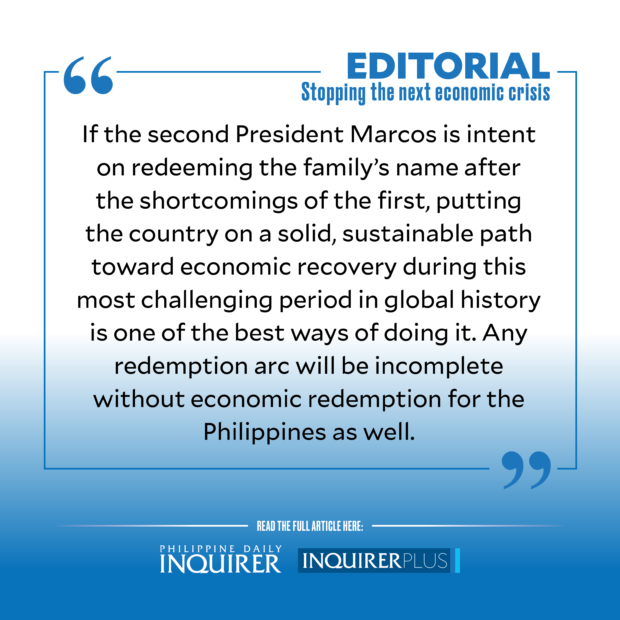Stopping the next economic crisis
The bad news is that the Philippines is facing the prospect of a prolonged regime of high inflation, no thanks to global and local issues adversely affecting the supply of basic goods, specifically food and petroleum.
Last week, the government announced that the inflation rate for May rose to 5.4 percent, which is the highest it has been in three and a half years, when the country was struggling with a rising consumer price index brought about mainly by a spike in rice prices. The first indication that these issues will linger came when regulators approved a round of long-overdue increases in the minimum wage of laborers across the country. This was followed by transportation regulators approving last week an increase in the minimum fare for jeepneys, also long overdue because of unrelenting fuel price hikes.
Aggravating this situation is the fact that the government, in responding to the coronavirus pandemic that began over two years ago, saw it necessary to borrow aggressively, both internationally and domestically, to finance its COVID-19 response. Finally, central banks all over the world have begun to raise interest rates that were previously brought down to historic lows to help the economy stay running at the peak of the pandemic. And because the government is laden with a ton of debt, higher interest rates will raise the cost of these loans, too.
Now for the good news: Thanks to his landslide election victory resulting in the largest winning margin in recent years, President-elect Ferdinand Marcos Jr. is armed with a surfeit of political capital that will be required to respond effectively to the looming economic crisis. Even better news is the fact that the outgoing economic managers of the current administration have crafted a fiscal consolidation plan that, if implemented properly by their successors, will help balance the books of government that were thrown off-kilter by the pandemic.
Implementing this plan effectively means the government will have to raise revenues by hiking existing taxes or imposing new ones — an unpopular move, but one that should be done as early as possible in the new administration. We cannot stress it enough: A credible fiscal consolidation program is critical for the incoming administration. Without this, the country’s debt levels will remain high and will, in turn, limit the government’s options in terms of implementing programs needed by Filipinos. Merely hoping that the economy would grow fast enough for the government to “outgrow” its debt is like rolling the dice that is heavily loaded against us. It may or may not work.
As for lowering inflation, painful structural reforms will be necessary to remedy a significant part of the local problem: the high cost of food. The incoming administration should refile a bill languishing in Congress that will impose a uniform and lower tariff rate for imported beef, pork, and chicken, as well as corn, which is a critical feed component. As it stands, Filipinos pay over twice the price for pork compared to the Thais, and 73 percent more compared to the Vietnamese. Filipino consumers also pay more than twice for chicken than the Thais and 44 percent more than the Vietnamese. In 2019, wholesale corn prices in the Philippines were 73 percent higher than in Thailand.
Alongside these reforms, the government should channel the funds from the lower import tariffs toward small farmers and entrepreneurs in these affected sectors to help them become more price competitive. As in the rice tariffication law experience, such reforms will result in short-term pain for the affected sectors, but will benefit millions of consumers with lower prices.
Faced with these difficult choices, the incoming administration faces the temptation to make populist choices that will ultimately lead the country in the opposite economic direction.
If the second President Marcos is intent on redeeming the family’s name after the shortcomings of the first, putting the country on a solid, sustainable path toward economic recovery during this most challenging period in global history is one of the best ways of doing it. Any redemption arc will be incomplete without economic redemption for the Philippines as well.
MORE EDITORIALS





















